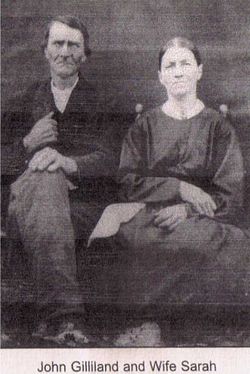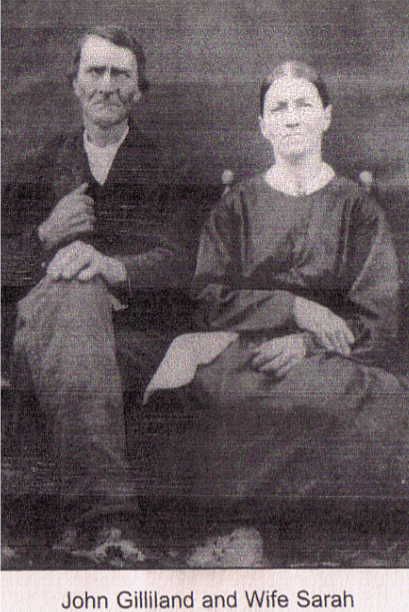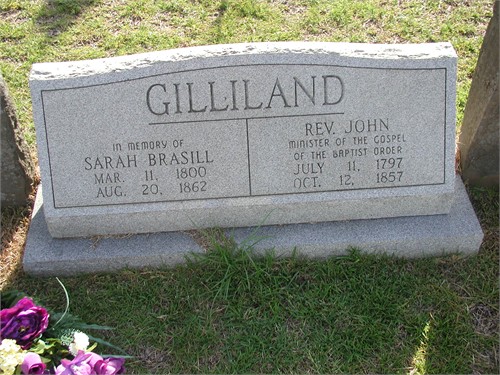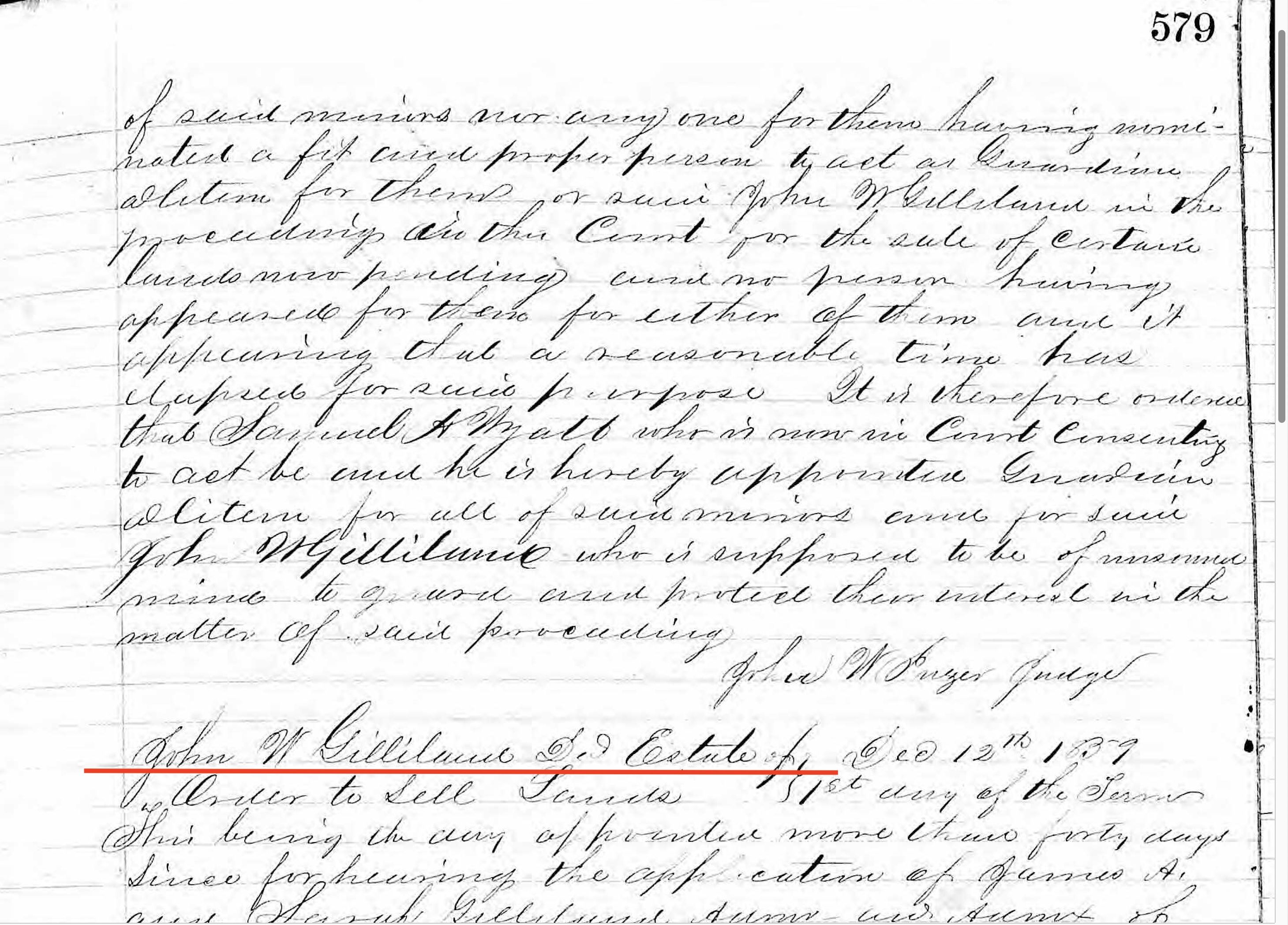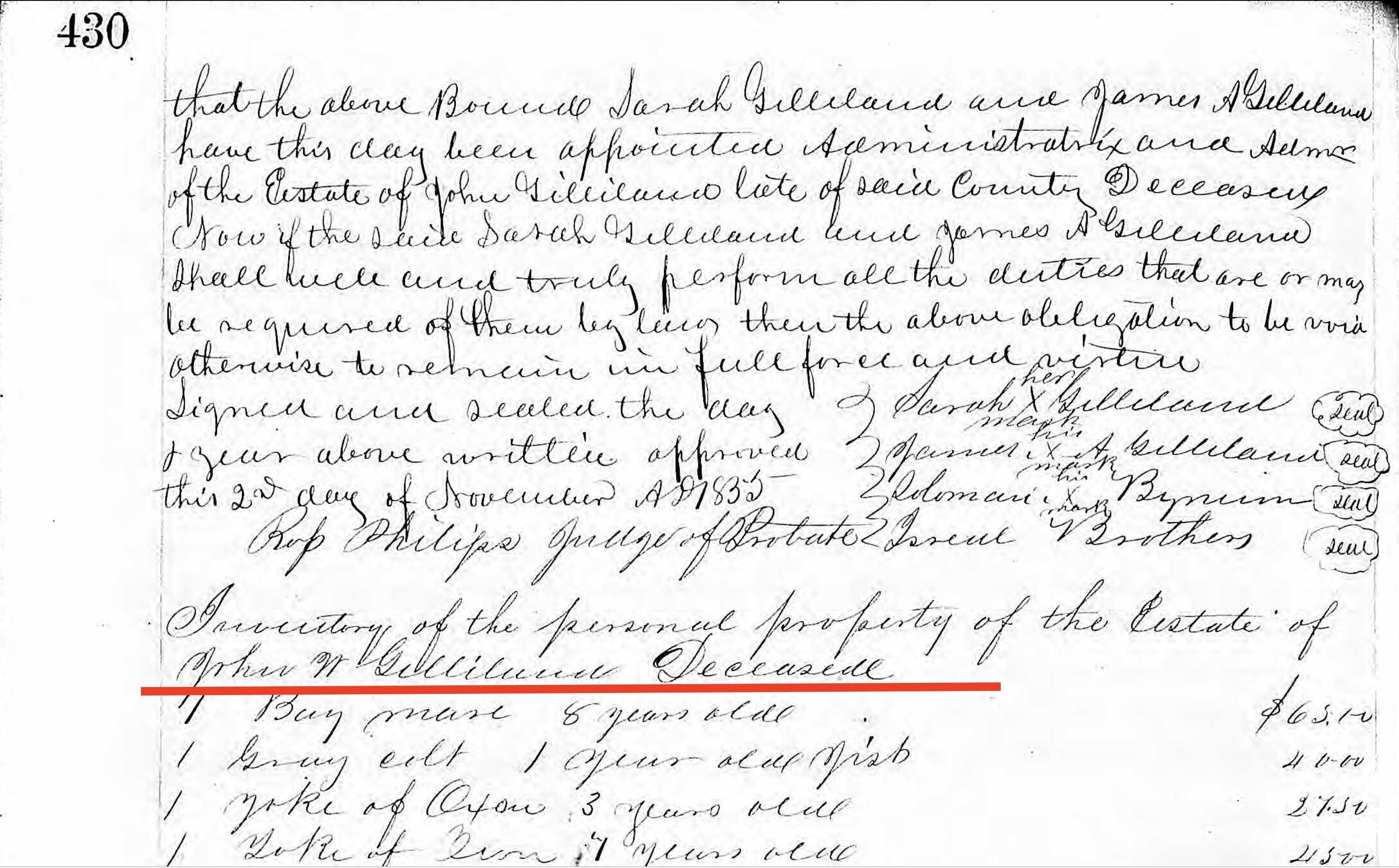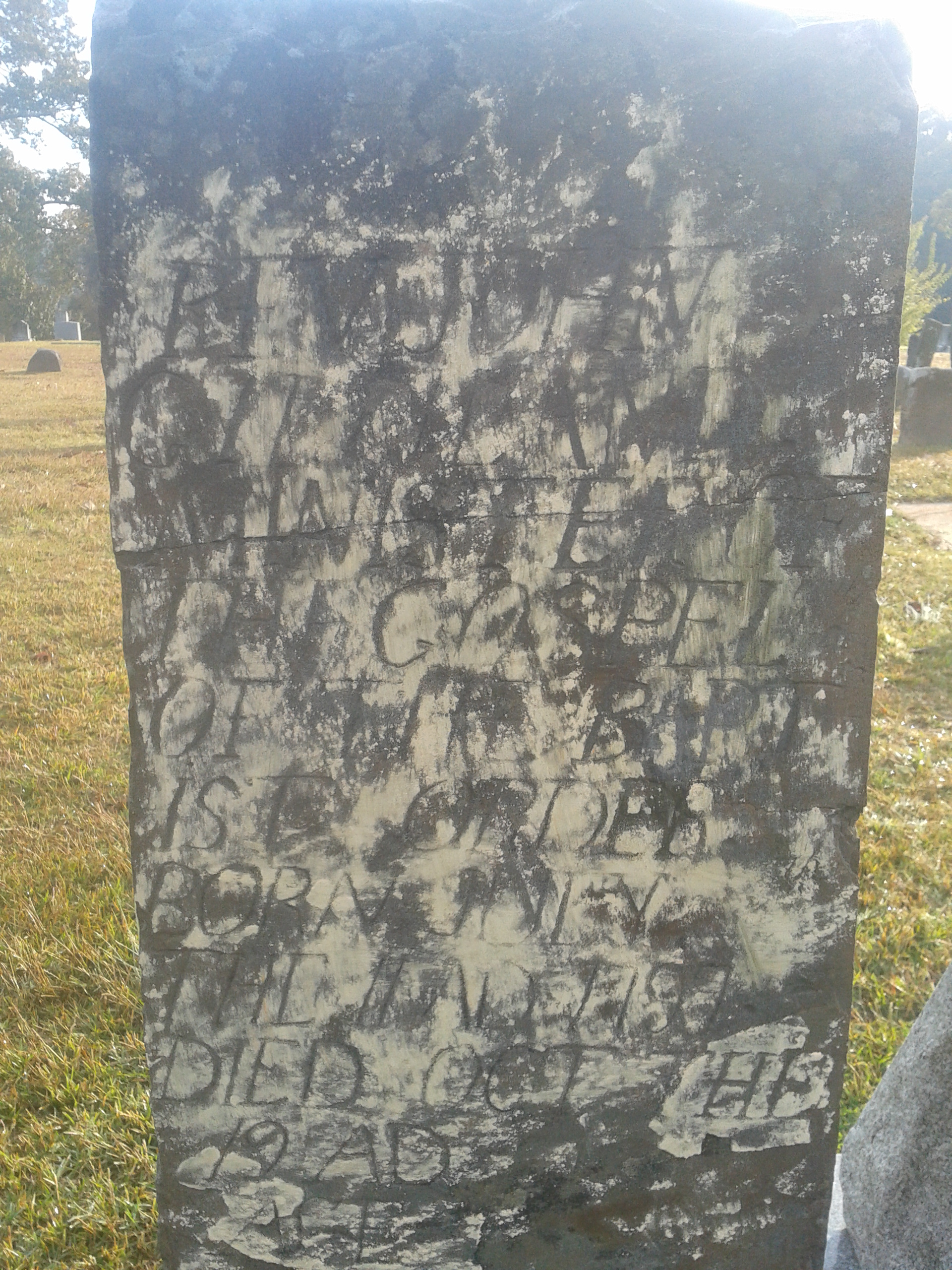Married to Sarah Elizabeth Brasill (sic) on 30th December 1819 and had 11 children: James Alexander Gilliland, Nancy Nesbit Gilliland, William Brasier Gilliland, Hiram Jackson Gilliland, Rebecca Jane Gilliland, Mary Ann Gilliland, Lucinda M. Gilliland, John W. Gilliland, Harvey Forney Gilliland, Daniel Harris Putnam Gilliland and Sarah Elizabeth Gilliland.
John Gilliland, of Blount County, Alabama
John1 Gilliland of St. Clair County, Alabama, was born 11 July 1797, in North Carolina, possibly Guilford County; died 19 October 1855. In his 1898 manuscript, Washington Asbury Saye stated the circumstances of his death: "Ransom the eldest child married very young to a Miss Gilliland[;] her father was their pastor and preached around in that county until his death which occurred in 1856, he was raising a corn crib[,] fell off and one of the logs fell on him, killed him instantly [sic]."
John Gilliland and Sarah Brasier applied for a Madison County, Alabama, marriage license 27 December 1819, and they were married 30 December 1819. Sarah Brasier was born 11 March 1800, in South Carolina; died 20 August 1862 in St. Clair County, Alabama. This South Carolina connection will be discussed further.
The marriage record was the only testimony that this couple or their families lived in Madison County, as there were no early deed or probate records for their surnames. Apparently, they moved to Blount County before 1822. John lived in this area in 1830, and his natural tendency to acquire property did not follow the norm generally ascribed to a preacher. In the mid to late 1830s, he owned property in Blount County, located west of Altoona, Alabama, and east of Highway 41. Ellison Crossroads, in Blount County, joined the eastern part of his former land:
John Gilliland to William Morton—Dec. 1834—for $550—SW¼ of Section 4, Township 11, Range 4 East—159 16/100 acres, in Huntsville District, State of Alabama—[signed] John GILLILAND, Sarah X her mark GILLILAND—Witnesses: Elias REED, James THOMPSON—recorded 8 January 1836. Sarah Gilliland was examined separately from her husband 30 December 1834.
John Gilliland was a minister of the gospel, apparently before 1830, because he performed several marriages before that year. However, his official authorization to conduct marriages was obtained in early 1830:
The State of Alabama. In a Special Orphan Court held in the Town of Blountsville in and for Blount County on the fifteenth day of February A.D. 1830.
To all whom it may concern. Know ye that John Gilliland (now of Blount County) this day produced to this court credentials of his ordination and of his being in regular communion with the Baptist Christian Society which it appears he is a member. This Testimonial is therefore to authorize the said John Gilliland to solemnize the Rites of Matrimony in said State of Alabama. [signed] Mace T. P. Brindley, Register of the Orphans Court of Blount County
On 3 September 1833, John Gilliland and Elijah Brashier witnessed a deed from Tandy Reed to William Edwards. John Gilliland, Justice of the Peace, married John Brasher and Louisa Davis 20 April 1826. John Gilliland married Sarah Brasier, and from these records it appears that family members were in the area. James Reed, of DeKalb County, Alabama, left a will dated 20 September 1850. His executors were Benjamin Reed and Thomas B. Watts, and the witnesses were Byers D. Gilliland and Thomas Petty (Will Book A).
A Brasher family lived in early Guilford County, North Carolina. Bazil, Jesse, Otto, Robert, Middleton, and Asa Brashear(s) are a few of those who acquired land from 1754–1761. That land was located in the former Orange County but is now in northeast Guilford County. A man named James Gilliland owned land located in the southwest corner of Guilford County in 1790, and the surname does not appear in county records after 1800. His property was near that of Jonas Ricks. There is a will record for a James Gilliland in Rutherford County, Tennessee, dated 3 February 1815. William Pope was named administrator, but the given names of his wife and children were not disclosed. Witnesses were: Hardy Pope, William Adkinson, and James Wells. None of the above surnames appear in Gilliland records in Alabama. John Gilliland named his first son James, but the preceding information is not yet linked to John's family.
Ransom Ricks and his sister, Huldah, each married one of John Gilliland's oldest children. Ransom Ricks married Nancy 7 August 1838. Both families lived northwest of Gadsden, Alabama, on property that is now located in Etowah County. James A. Gilliland lost his first wife, Nancy Malone (said to be part Indian), and he married (2) Huldah Ricks 14 May 1841. It is possible that Elder John Gilliland conducted marriage services for James and Huldah. Family tradition is that John was a licensed minister in northern Alabama as early as 1831, according to his descendants now living in Attalla, Alabama. This tradition is supported not only by the orphan's court declaration, but also by local church records. Elder Gilliland did not marry Ransom and Nancy Ricks.
Union Baptist Church was one of seven churches dismissed from the Mount Zion (church) Association in 1836 to form the Wills Creek United Primitive Baptist Association. Bethlehem Baptist Church, Gallant, St. Clair County, Alabama, was one of the churches in the original Wills Creek Association, organized at Old Harmony Church, Gadsden, Alabama, 21 May 1833. When Etowah County was formed in 1868, Bethlehem Church fell within that county. The first pastor was John Gilliland.
The early minutes of that church do not survive, but extant copies begin about 1876 and continue to the present. Entries in Book I, 1876-1895, reveal that James A. and Huldah Gilliland were members in 1876, and that Andrew M. Ricks was deceased by 1876. James Gilliland, son of James A. and Huldah Gilliland, was ordained to preach there in 1890. He was the Bethlehem Baptist Church preacher in 1894.
Ransom Ricks purchased 80.006 acres of land under the Act of Congress of 1820. The deed shows the property located approximately five miles northwest of Attalla, Alabama, and west of US highway 431, two miles northwest of Ridgeville, Alabama. John Gilliland bought that same property from Ransom and Nancy Nesbit Ricks 13 June 1848, for the sum of $108. The deed was signed by Ransom Ricks and Nancy X (her mark) Ricks in the presence of Reuben Ricks and James A. Gilliland. Nancy Nesbit Ricks appeared before Thomas Logan, J. P., DeKalb County, as consort wife of Ransom Ricks and relinquished her right to dower 24 June 1848. Ransom appeared before the same J. P., 6 July 1848, and acknowledged the transfer. All the land mentioned was at that time located in DeKalb County, but the records were later recorded in Etowah County books when the county was formed in 1868. John Gilliland and his wife, Sarah, sold land valued at $1,200 to Isham Sheffield 10 August 1850.
James A. Gilliland also purchased on the same day Public Domain land located south of Ransom's land. This land is located at Noble Hill Church, 2 ½ miles north-northeast of Ridgeville, Alabama, and 5 ½ miles north of Attalla, Alabama. Other records are available for James and Huldah Gilliland. On 9 June 1882, they assigns mineral, water, and land rights to S. F. Fowler.
Source: Donald Milton Ricks, The Descendants of Jonas Ricks and Other Ricks Families in America (Dexter, Mich.: Thomas-Shore, Inc., 1998), pp. 238-240. A copy of this source is at the Museum at Oneonta, Blount County, Alabama.
Married to Sarah Elizabeth Brasill (sic) on 30th December 1819 and had 11 children: James Alexander Gilliland, Nancy Nesbit Gilliland, William Brasier Gilliland, Hiram Jackson Gilliland, Rebecca Jane Gilliland, Mary Ann Gilliland, Lucinda M. Gilliland, John W. Gilliland, Harvey Forney Gilliland, Daniel Harris Putnam Gilliland and Sarah Elizabeth Gilliland.
John Gilliland, of Blount County, Alabama
John1 Gilliland of St. Clair County, Alabama, was born 11 July 1797, in North Carolina, possibly Guilford County; died 19 October 1855. In his 1898 manuscript, Washington Asbury Saye stated the circumstances of his death: "Ransom the eldest child married very young to a Miss Gilliland[;] her father was their pastor and preached around in that county until his death which occurred in 1856, he was raising a corn crib[,] fell off and one of the logs fell on him, killed him instantly [sic]."
John Gilliland and Sarah Brasier applied for a Madison County, Alabama, marriage license 27 December 1819, and they were married 30 December 1819. Sarah Brasier was born 11 March 1800, in South Carolina; died 20 August 1862 in St. Clair County, Alabama. This South Carolina connection will be discussed further.
The marriage record was the only testimony that this couple or their families lived in Madison County, as there were no early deed or probate records for their surnames. Apparently, they moved to Blount County before 1822. John lived in this area in 1830, and his natural tendency to acquire property did not follow the norm generally ascribed to a preacher. In the mid to late 1830s, he owned property in Blount County, located west of Altoona, Alabama, and east of Highway 41. Ellison Crossroads, in Blount County, joined the eastern part of his former land:
John Gilliland to William Morton—Dec. 1834—for $550—SW¼ of Section 4, Township 11, Range 4 East—159 16/100 acres, in Huntsville District, State of Alabama—[signed] John GILLILAND, Sarah X her mark GILLILAND—Witnesses: Elias REED, James THOMPSON—recorded 8 January 1836. Sarah Gilliland was examined separately from her husband 30 December 1834.
John Gilliland was a minister of the gospel, apparently before 1830, because he performed several marriages before that year. However, his official authorization to conduct marriages was obtained in early 1830:
The State of Alabama. In a Special Orphan Court held in the Town of Blountsville in and for Blount County on the fifteenth day of February A.D. 1830.
To all whom it may concern. Know ye that John Gilliland (now of Blount County) this day produced to this court credentials of his ordination and of his being in regular communion with the Baptist Christian Society which it appears he is a member. This Testimonial is therefore to authorize the said John Gilliland to solemnize the Rites of Matrimony in said State of Alabama. [signed] Mace T. P. Brindley, Register of the Orphans Court of Blount County
On 3 September 1833, John Gilliland and Elijah Brashier witnessed a deed from Tandy Reed to William Edwards. John Gilliland, Justice of the Peace, married John Brasher and Louisa Davis 20 April 1826. John Gilliland married Sarah Brasier, and from these records it appears that family members were in the area. James Reed, of DeKalb County, Alabama, left a will dated 20 September 1850. His executors were Benjamin Reed and Thomas B. Watts, and the witnesses were Byers D. Gilliland and Thomas Petty (Will Book A).
A Brasher family lived in early Guilford County, North Carolina. Bazil, Jesse, Otto, Robert, Middleton, and Asa Brashear(s) are a few of those who acquired land from 1754–1761. That land was located in the former Orange County but is now in northeast Guilford County. A man named James Gilliland owned land located in the southwest corner of Guilford County in 1790, and the surname does not appear in county records after 1800. His property was near that of Jonas Ricks. There is a will record for a James Gilliland in Rutherford County, Tennessee, dated 3 February 1815. William Pope was named administrator, but the given names of his wife and children were not disclosed. Witnesses were: Hardy Pope, William Adkinson, and James Wells. None of the above surnames appear in Gilliland records in Alabama. John Gilliland named his first son James, but the preceding information is not yet linked to John's family.
Ransom Ricks and his sister, Huldah, each married one of John Gilliland's oldest children. Ransom Ricks married Nancy 7 August 1838. Both families lived northwest of Gadsden, Alabama, on property that is now located in Etowah County. James A. Gilliland lost his first wife, Nancy Malone (said to be part Indian), and he married (2) Huldah Ricks 14 May 1841. It is possible that Elder John Gilliland conducted marriage services for James and Huldah. Family tradition is that John was a licensed minister in northern Alabama as early as 1831, according to his descendants now living in Attalla, Alabama. This tradition is supported not only by the orphan's court declaration, but also by local church records. Elder Gilliland did not marry Ransom and Nancy Ricks.
Union Baptist Church was one of seven churches dismissed from the Mount Zion (church) Association in 1836 to form the Wills Creek United Primitive Baptist Association. Bethlehem Baptist Church, Gallant, St. Clair County, Alabama, was one of the churches in the original Wills Creek Association, organized at Old Harmony Church, Gadsden, Alabama, 21 May 1833. When Etowah County was formed in 1868, Bethlehem Church fell within that county. The first pastor was John Gilliland.
The early minutes of that church do not survive, but extant copies begin about 1876 and continue to the present. Entries in Book I, 1876-1895, reveal that James A. and Huldah Gilliland were members in 1876, and that Andrew M. Ricks was deceased by 1876. James Gilliland, son of James A. and Huldah Gilliland, was ordained to preach there in 1890. He was the Bethlehem Baptist Church preacher in 1894.
Ransom Ricks purchased 80.006 acres of land under the Act of Congress of 1820. The deed shows the property located approximately five miles northwest of Attalla, Alabama, and west of US highway 431, two miles northwest of Ridgeville, Alabama. John Gilliland bought that same property from Ransom and Nancy Nesbit Ricks 13 June 1848, for the sum of $108. The deed was signed by Ransom Ricks and Nancy X (her mark) Ricks in the presence of Reuben Ricks and James A. Gilliland. Nancy Nesbit Ricks appeared before Thomas Logan, J. P., DeKalb County, as consort wife of Ransom Ricks and relinquished her right to dower 24 June 1848. Ransom appeared before the same J. P., 6 July 1848, and acknowledged the transfer. All the land mentioned was at that time located in DeKalb County, but the records were later recorded in Etowah County books when the county was formed in 1868. John Gilliland and his wife, Sarah, sold land valued at $1,200 to Isham Sheffield 10 August 1850.
James A. Gilliland also purchased on the same day Public Domain land located south of Ransom's land. This land is located at Noble Hill Church, 2 ½ miles north-northeast of Ridgeville, Alabama, and 5 ½ miles north of Attalla, Alabama. Other records are available for James and Huldah Gilliland. On 9 June 1882, they assigns mineral, water, and land rights to S. F. Fowler.
Source: Donald Milton Ricks, The Descendants of Jonas Ricks and Other Ricks Families in America (Dexter, Mich.: Thomas-Shore, Inc., 1998), pp. 238-240. A copy of this source is at the Museum at Oneonta, Blount County, Alabama.
